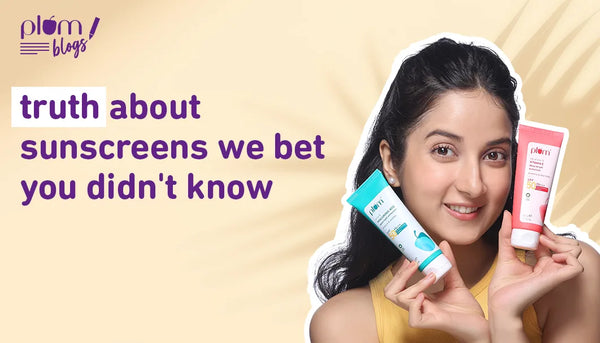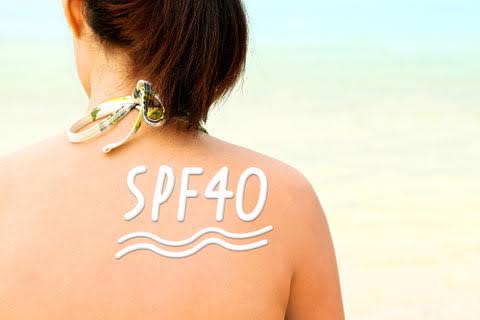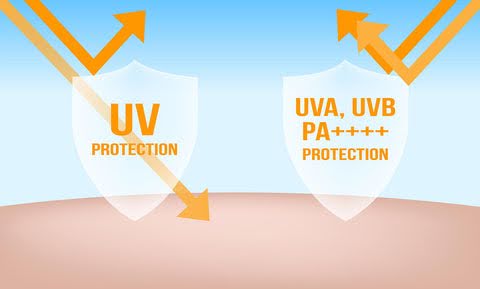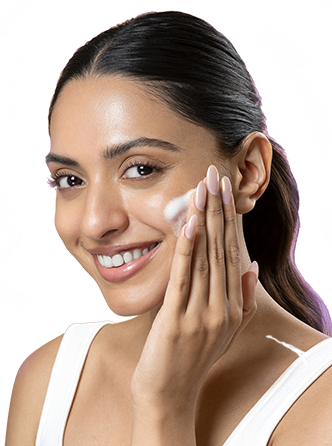
IN THIS ARTICLE
How do you buy sunscreens? Do you follow your favorite influencer while they recommend the best sunscreen for women, or just purchase one with the highest SPF?
Whatever your answer, here is what you need to know! Sun protection cream is much beyond SPF and fancy labels.
Sun defense creams have a lot more within them that determine their efficacy and the sun protection they offer.
Therefore, before you shop for a sunscreen, there are certain facts about them that you must know.
6 facts to understand your sunscreen better
Fact 1: SPF 40 is not twice as good as SPF 20

Sure, the best sunscreen for women and men is the one that has a high SPF value (what is SPF?). But, if you pick up a sunscreen just because it contains a higher or lower SPF range, it could be a grave mistake!
Yes, SPF 40 is better than SPF 20, but it does not mean that it provides double protection.
Instead, your choice of SPF number depends on the extent of your sun exposure and skin type.
While a higher SPF is suggested for longer sun protection, a lower SPF is useful when you are not directly exposed to sun rays the entire day.
However, even then, reapplication is a must.
You not only need to ensure that you apply a sufficient amount of sun cream, but you must also reapply every three hours during the day to ensure your skin is well protected.
Fact 2: PA factor is as important as SPF

Only a few know and ponder about PA ratings on sunscreen. PA stands for the protection grade of UVA which is equally important as SPF. SPF only protects your skin against visible damage (darkening, reddening) from UVB rays.
On the other hand, UVA rays, also part of sunlight, cause more “underlying” damage and wrinkles. PA factor protects against UVA rays. It is measured as PA+, PA++, PA+++, and PA++++, the higher the +, the better the sun protection.
Therefore, look at the labels carefully while choosing sunscreen for your skin.
Fact 3: How you apply sun cream matters

If you worry only about finding ‘which sunscreen is the best”, here is the catch! The sun protection your skin receives is also determined by how you apply the sunscreen.
- You must apply sunscreens at least 15 - 20 minutes before stepping out in the sun.
- Dispense at least two finger lengths of the product, apply evenly on the face and neck and gently massage it in an upward motion until it is completely absorbed.
- Use it as the final step of your skincare regimen after moisturizing.
- Reapply every 2-3 hours, or more if you go swimming or sweat.
Fact 4: Is sunscreen enough? Nope!

Sunscreen does not provide 100% protection against sun damage. When you step out in peak sun rays, you need physical barriers too. Opt for barriers like hats, umbrellas, sunglasses, and full-sleeved clothing to further protect your skin.
Fact 5: Look deeper to know which sunscreen is the best?

The use of antioxidants, skin restructuring agents, and soothing actives can lessen the impact of UV rays on the skin. Think sea buckthorn, bio-sugars, gotu kola (Centella asiatica aka cica!), and aloe as examples. When introduced into your skincare regime, these actives help tackle the impact of UV rays much better than just sunscreen cream or sunscreen lotion.
Moreover, actives like alpha arbutin reduce melanin production and prevent tanning, while vitamin C helps fade dark spots and boost the glow in your skin.
Fact 6: The sun does not spare dark-skinned people
While darker skin may have more inherent melanin, they are still at risk. Sure, people with fairer skin are more prone to sun damage, but UV rays can damage the skin even if you have darker skin tones. Therefore, it's essential for everyone, regardless of skin color, to wear sunscreen and reduce the risk of sun-related damage.
To sum up
There’s no such thing as 100% sun protection. However, you can significantly lessen UV's impact on your skin with the right sunscreens for the face. And while SPF helps do that, it’s not the whole story!
FAQs
1. What are the things to consider while choosing sunscreen?
While buying a good sunscreen for your skin, consider the following factors: -
- It should have the required SPF and PA
- It should suit your skin type
- It should be a broad spectrum
- It should have nourishing ingredients like hyaluronic acid, cica, vitamin E, etc.
2. Is it okay to use an everyday lotion with SPF in it?
Yes, you can use a lotion as a sunscreen for everyday use if it has a SPF of 35 in it. However, you must apply an adequate amount and reapply after 3 hours, especially if you are outdoors.
Sunscreens have more sun protection than lotion with SPF, and therefore, consider your duration and the intensity of the sun rays while choosing between the two.
3. Is it okay to never wear sunscreens?
Though not wearing sunscreens is a personal choice, it can harm your skin significantly. Sunscreen protects the skin from harmful UV rays, reducing the risk of sunburn, premature aging, and skin cancer.
Regular use of sunscreen is a crucial aspect of maintaining overall skin health.



















